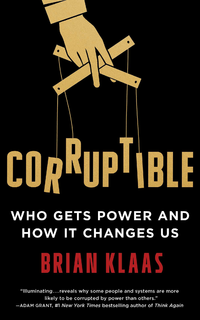Mentions
- Post
“it's a lot easier to overcome any trigger-finger hesitations you might have with a disturbing trick: don't think of the person you're killing as a human being. Instead, mentally transform the person into a disposable subhuman abstraction. History's worst atrocities are usually preceded by language that equates human beings with insects, vermin, even objects. Slaves were referred to as stock. Native Americans were called savages. Rwanda's perpetrators of genocide depicted Tutsi as cockroaches
Nazis referred to Jews as rats and depicted them on posters as lice.
But in most of the worst acts of human cruelty and abuse, the perpetrators tried to create social distance between themselves and their victims. Unable to change the temporal, spatial, or experiential aspects of killing, the focus remained on devaluing the lives of the "enemy" It helped overcome the perpetrators' human instinct, our aversion to killing.” - Brian Klaas, Corruptible, Page 216

- Post
“Italy's railroads were in a sorry state after World War I. But most of the investments made for their repair and reform occurred before Mussolini took power. Once he became a dictator, Mussolini focused on vanity infrastructure, creating ornate train stations on rail lines for the country's elite, while ignoring commuter trains that served the masses. Hundreds of people died in construction projects under Mussolini-and most of the trains still didn't run on time. For the trains that did run on time, the decisions made by Mussolini's predecessor played a much-bigger role in making that possible. Nonetheless, the Italian fascist did what so many in power do masterfully: he took credit for decisions made by others. If you only focus on surface-level results without examining the underlying context or the decision-making itself, you’ll end up reinforcing bad behavior rather than deterring it.” -Brian Klaas, Page 198-199

- Post
“People who are good at getting into power are also good at creating narratives that cast them in better light than reality. They’re skilled at making us think they did a good job even when they screwed up. Better scrutiny of decision-making processes can counter-act that.” - Brian Klaas, Page 196

- Post
“The challenge facing us is figuring out how to get more of those shy incorruptibles to start competing with the overconfident narcissistic corruptibles who were born believing that they deserve power because they're God's gift to man.” - Brian Klaas, page 184

- Post
“Kyle Hopkins… Partnering with ProPublica broke a major story. His reporting won a Pulitzer Prize for uncovering a startling fact: convicted repeat offenders were being hired as police officers with astonishing frequency in Alaska. It shouldn't have been happening. But it was. And in Stebbins, Hopkins discovered another shocking fact. Every officer-every single one-had been convicted of domestic violence. If your boyfriend or husband was beating you, calling the cops just ensured that another abuser would come to your house. The rot went right up to the top, too. The police chief had been convicted of seventeen crimes, including felony assault and sexual abuse of a minor. The crooks had taken over the station.
How could that have happened?
The answer is simple. There weren't any qualified applicants.” - Brian Klaas, Page 182

- Post
“All of this serves a crucial purpose that dictators learn over time: it's a loyalty test that sorts people you can trust from people you can't. If people are willing to publicly embarrass themselves by spouting obviously absurd lies about the "Dear Leader" then they're more likely to be worthy of the regime's trust.
A henchman who parrots absurdities is a henchman worth investing in. The problem, though, is that eventually those myths surrounding the leader become commonplace in society, so nobody is going out on a limb to repeat them.
The solution? Invent crazier myths, constantly testing people… to see who goes along with it and who doesn't. That strategy creates a ratcheting effect: if the lies don't get more extreme, your loyalty tests become useless. It appears that dictators' thirst for absolute control is warping their minds, when it's often just a sharpening of their strategies. Power didn't corrupt them. They learned to be good at being bad.”

- Post
“Learning is an integral part of getting power and holding on to it. That creates a misperception. I you analyzed the data, it would appear as if someone were getting worse over time— that power was corrupting them. In fact, their bad intent may have been static while their effectiveness increased. They were always corrupt. They just got better at it.”

- Post
“But unlike Scrooge, Raucci had no moral awakening. Instead, his behavior got progressively worse. He sexually harassed subordinates. Anyone who challenged him faced threats. When his secretary casually remarked during watercooler banter that Raucci wasn't "her type," he transferred her to a worse office…
…Raucci warned that nobody should cross him, lest he have to "eliminate" them. "Only I will be the fixer…
The person wrote an anonymous letter, detailing Raucci's abuses as president of the maintenance unit. He wasn't fit for union leadership, the letter claimed.
Raucci went ballistic. Someone had double-crossed him.” - Brian Klaas

- Answered to The best book you’ve read in 2022?
- From Twitter
